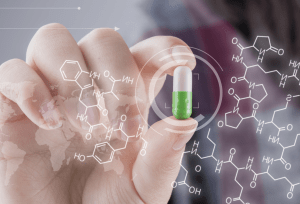Introduction: Innovation in Drug Development
Pharmaceutical companies face significant challenges when bringing new products to market. The drug development process is a lengthy and expensive one, taking between 10 to 15 years. Clinical trials are also prone to failure at a rate of 90%. The challenges are caused by slow drug discovery, complicated clinical trials, and regulatory bottlenecks.
In recent years, generative AI has become a powerful tool for accelerating drug development. AI transforms drug discovery, regulatory approval, and trial design by leveraging machine learning, deep learning, and big data analytics. This helps pharmaceutical companies reduce costs, improve success rates, and deliver life-saving treatments faster.
This article explores how Gen AI is revolutionizing drug discovery in three key areas, including clinical trials and regulatory approval.
Gen-AI: Enhancing Drug Discovery
Identifying new drug candidates is one of the most difficult challenges in drug development. Drug discovery is a time-consuming, expensive process that involves testing thousands of compounds in a laboratory.
Gen-AI transforms drug discovery
Generated AI can speed up drug discovery by:
- AI-driven molecular designing – AI is able to generate novel drug candidates that have optimized properties. This reduces the need for extensive lab testing.
- AI models can predict drug-target interactions by analyzing biological and chemical data. This allows them to better identify hits.
- AI optimizes lead compounds to improve efficacy, bioavailability, and solubility. This reduces early-stage failures.
Case Study: AI-Generated Drug Candidates
Gen-AI has been used successfully by pharmaceutical companies such as Insilico Medicine, BenevolentAI, and others to create promising drug candidates. Insilico Medicine, for example, has successfully used Gen-AI to design promising drug candidates.
Pharmaceutical companies can reduce R&D costs and timelines by leveraging AI to discover molecular targets. This will make drug development more efficient.
Optimizing Clinical Trial Design and Patient Recruitment
Clinical trials are the major bottleneck for drug development. They account for up to 60% of all costs. However, they have high failure rates. This is due to poor patient selection, inefficient design, and unexpected side effects.
AI Enhances Clinical Trials
Generated AI optimizes clinical trials through:
- AI can analyze vast datasets, including electronic health records (EHRs), genome data, and real patient data. This allows for better design of trial protocols.
- AI-driven stratification of patients – AI can identify the best patients for clinical trials using biomarkers. This reduces dropouts and improves study accuracy.
- Predictive analytics to optimize drug trials – AI can predict how different patient groups are going to respond.
AI in Clinical Trials: An Example from the Real World
AI-powered platforms like Medidata and Deep 6 AI are changing clinical trials. They do this by automating patient recruitment and improving study protocols. AI-driven analyses of data from oncology trials have led to improved drug success rates and faster recruitment.
AI can help improve patient outcomes and speed up drug approvals. It does this by reducing the number of failed clinical trials and by better matching patients.
Accelerating the regulatory approval process
Even after successful tests, getting regulatory approval can take years. Agencies like the FDA, EMA, and CFDA require a lot of paperwork and safety checks.
AI streamlines regulatory compliance
Automation of regulatory submissions: AI-powered systems are able to generate and organize regulatory documentation, reducing the amount of time and human error.
AI models can predict safety and efficacy by analyzing historical data on drug approvals.
AI improves compliance with global regulations: AI aligns drug applications with FDA, EMA, and CFDA requirements. This reduces delays.
Pharmaceutical companies can reduce approval times and streamline regulatory submissions by using AI-driven automated and predictive analytics.
Ethical and Challenges Considerations
AI-driven drug discovery is not without its challenges, despite its benefits.
- Data privacy and security – AI relies heavily on patient data that is sensitive, which requires strict compliance with HIPAA and GDPR.
- Biased AI models – AI can produce results that are skewed, which could affect patient safety.
- AI-generated drugs must be validated using clear protocols to gain regulatory approval.
- AI must be supervised by humans – AI must not replace human expertise but rather complement it. This will ensure safety and accountability.
Pharmaceutical companies need to address these challenges by collaborating with humans and regulating AI, as well as being transparent.
AI-Driven Solutions in the Life Sciences Industry
AI also transforms related fields, such as machine translation and workflow automation for pharmaceutical companies.
ECI Link: Streamlined Localization for Your Projects of Regulatory and Clinical Documentation
Combine AI with human expertise: Enterprise-grade AI-powered translation platforms integrate human reviews for accuracy and compliance.
AI-driven Translation Management Systems: Manage tasks and track progress easily with a user-friendly Translation Management System (TMS).
AI translates with accuracy and precision for niche industries: AI is tailored to the terminology of pharmaceuticals and life sciences, reducing errors.
AI will play a greater role in pharmaceutical research and documentation. This will make drug development more efficient.
Conclusion: The Transformative Effect of Gen-AI
Generative Artificial Intelligence (AI) is changing how new drugs are developed and approved. It speeds up drug discovery, improves trials, and makes it easier to follow rules.
Takeaways:
- Faster drug discovery – AI reduces time and costs in identifying drug candidates.
- Improved clinical trial success – AI enhances patient selection and predictive modeling.
- Streamlined regulatory approval – AI automates compliance and documentation.
However, to fully integrate AI in pharmaceutical R&D, companies must address ethical challenges, regulatory concerns, and data security issues.
The pharmaceutical industry can develop drugs faster, safer, and at a lower cost by embracing AI-human collaborative efforts. This will ultimately bring life-saving treatments for patients around the world.
AI-driven, human-led localization solution
ECI Link: Streamlined Localization for Your Projects aims to deliver the most effective and pragmatic AI implementation in your product localization and content translation processes. ECI Link combines custom-trained language models, AI quality processes, and human expertise into one platform. We challenge the classic tradeoff between quality, speed, and price by pushing the efficiency frontier to the next level.





